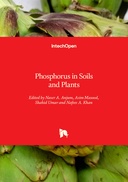Explore

Phosphorus in Soils and Plants
0 Ungluers have
Faved this Work
Login to Fave
Phosphorus (P) stands second to nitrogen in terms of its essentiality as a plant macronutrient, as well as due to its involvement in almost all plant developmental stages, primary and secondary plant metabolisms, maintenance of membrane structures, and in the structural skeleton of major biomolecules. An optimum P-supply also helps plants combat abiotic stress impacts. Most P in soil remains unavailable for uptake by plants. P-containing fertilizers are being added to agricultural lands to sustain high yields. Only the least amount of the applied P (20%–30%) is used by most cultivated plants, and the rest remains as legacy P (P surpluses), which eventually causes eutrophication. This book, Phosphorus in Soils and Plants, reviews P in soils and plants, P dynamics in the soil–water–sediment environment, the major roles of P in the photosynthetic dark phase-biochemical pathways, major approaches for the sustainable management of P in agriculture, main mechanisms underlying the role of P in the regulation of plant–microbe interactions in the rhizosphere, literature on the role of microbial phosphate solubilization in management of soil and plant nutrients, and insights into P recovery through waste transformation. This volume is an important resource for plant biologists involved in teaching or research who wish to advance their knowledge of P in soils and plants.
This book is included in DOAB.
Why read this book? Have your say.
You must be logged in to comment.
